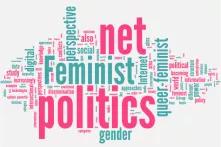The public space of the internet is a far more hazardous place for women and LGBTI people than for other groups. We must defend and expand it as a free space.

Feminist internet policy focuses on four major areas: access to the internet, access to content, copyright, and data protection. The digital public is now considered the fifth major area. Each of them requires an intersectional feminist perspective that examines these new technologies for intersecting and overlapping forms of discrimination based on gender, origin, or skin color.
In order to create strategies to counteract everyday discriminatory structures, we need to understand how they are perpetuated and even strengthened under governmental and corporate control.
First of all, access to the internet is unevenly distributed. Yet (gender-)equitable access is vital for the social, economic, and also educational development of every individual and every society. Feminist internet policy, in combination with feminist economics, can provide the guidelines we need to address this issue.
Worldwide, 12 percent fewer women than men use the internet. Even in countries like Germany, where at least the group of 14- to 29-year-olds enjoys equal access to the internet, there are stark differences overall with regard to an individual’s economic situation, often combined with gender, origin, and skin color.
The internet is white and male
Once people are online, it’s about equal access to content, about the neutrality of the internet or in a technical term: net neutrality. Access to content includes the ability to create content and reach audiences, in other words, to blog, tweet, comment, or share photos on Instagram. Wikipedia is one of the few projects that have lasted beyond the internet’s democratic peak in the nineties and early 2000s to the present day.
The platform's mission is to make the world’s knowledge more accessible free of charge. But despite all its undeniable merits, the question remains: How diverse can this knowledge be if 90 percent of it is compiled by white, well-educated, middle-aged men?
This massive lack of diversity affects community standards, among other things. For instance, women and their knowledge are often treated very differently from men and their contributions – whether consciously or not. Women’s perspectives are far more likely to be questioned in the comment sections, and their contributions are devalued by sexual innuendo and gender stereotypes.
In the case of Facebook, that means that displays of non-conforming female bodies are regulated, whereas rape jokes are rarely or never sanctioned.
Beyond being threats in themselves, hate speech and digital violence go hand in hand with the misuse of personal data. But the means to protect one’s own data on the internet are as unevenly distributed as the vulnerabilities.
Thus, for women, women of color, black women, and LGBTI people, the public space of the internet is far more hazardous than it is for other groups.
The digital public sphere, our culture of communication, and the violence that is taking hold there are urgent issues because they lead to an exclusion of women, in particular. The internet’s emancipatory and democracy-building potential is in danger. Feminist internet policy can help support processes that promote an open and non-violent society.
Digital violence has been a widespread problem since the commercialization of the net in the 1990s, from hate speech to incitement to hatred, cybersexism, online harassment, cyberstalking, or doxing. All these threats have in common that they mainly target women, women of color, black women, and LGBTI people.
Several studies have already proven this phenomenon at the international level, but there are no reliable figures for Germany. The Gunda-Werner-Institute, in collaboration with Civey (online opinion surveys at https://civey.com), has found that around 67 percent of women have stopped engaging in online debates altogether. Of the few who still do, two thirds said that they had withdrawn from debates in the face of hate comments made against them.
Self-regulation is preferable to government intervention
This means that the remaining, and thus dominating, voices in the discourse are patriarchal, right-wing populist, or right-wing conservative. Police complaints also indicate that women are frequent targets of online aggression. Very few people overall file criminal charges related to harassment on the internet, but those who do are mostly women.
So how can we regulate in a way that offers protection without restricting freedom of speech? How can we promote non-violent communication online? How does decency become the norm?
For a long time, the favored model was that of self-regulation: ‘netiquette’ guidelines or appeals to users to formulate hate-free, non-violent positions in the comments sections. Legal intervention was mostly rejected. From the point of view of the online community, there are several reasons to favor this approach. Firstly, there is a Sword of Damocles dangling over almost any attempt to solve problems via government regulation, and that is data retention - a considerable invasion of privacy.
Self-regulation is thus the preferred solution to keep governments from curtailing the valuable asset of freedom of speech. There are justified fears that data-hungry governmental structures might become overbearing and end up restricting freedom of expression. That’s why there is a need for a feminist debate on the extent of state interference that should be permitted in online communication.
Patriarchal values and norms have long dominated the legal and value systems even of Western liberal democracies. Moreover, many countries, among them Germany, suffer from institutional racism. Yet as soon as we call for more legal regulation, we are facing the threat of increased surveillance structures. The usefulness and effectiveness of (state) penalties is a controversial and yet unanswered question.
In order to find a feminist position, we should look at a hotly debated example of state regulation in Germany, the Network Enforcement Act.
This law, which took full effect in January 2018, obligates social networks such as Facebook to delete “obviously criminal content” within 24 hours and any illegal content within seven days. Failure to do so can entail fines of up to 50 million euros.
So now Facebook, a for-profit corporation, determines what is “obviously criminal” and what is “only” illegal. Critics of the law fear that financial penalties can also lead to the deletion of legal content and thus be a threat to freedom of expression.
Money, power, and violence reign over the internet
Undesirable (political) opinions are flagged in the hope that Facebook will simply delete them. This is also problematic because the law does not determine how networks should deal with posts that are deleted by error.
But the law has one merit: it requires a service address of an authorized recipient for complaints in the respective country, in the case of the NetzDG: Germany. This means that the police and public prosecutors now finally have a contact person in Germany to whom they can address their requests for information. Previously, there was only one authorized recipient in Ireland.
It is now possible to file complaints and serve them in Germany. This is a real step forward for lawyers who represent digital violence victims. The real-life impact of the law is not as pronounced as expected. Although many comments are deleted, this will help victims of digital little if the crime is not legally pursued. In addition, there is still no social and political strategy against digital violence, but such a strategy is essential to tackle digital violence.
“We will create a civilization of the Mind in Cyberspace. May it be more humane and fair than the world your governments have made before.” This is how John Perry Barlow concluded his “Declaration of the Independence of Cyberspace” in 1996. About 20 years later, we must admit that our digital world is primarily governed by money and power. Therefore, it is vital that we address these structural imbalances and that we treat online violence as a collective, not just an individual problem.
Note: A German version of this article was first published on January 25, 2018 in Böll.Thema 1/2018: digital ist okay! This article was also published (12th November 2019) online via hiig.de and is part of the publication "Critical Voices, Visions and Vectors for Internet Governance".


